罗素论中国教育
中国问题罗素
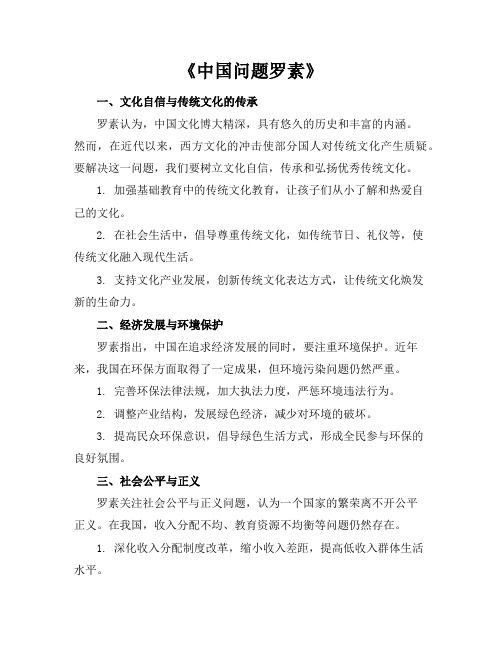
《中国问题罗素》一、文化自信与传统文化的传承罗素认为,中国文化博大精深,具有悠久的历史和丰富的内涵。
然而,在近代以来,西方文化的冲击使部分国人对传统文化产生质疑。
要解决这一问题,我们要树立文化自信,传承和弘扬优秀传统文化。
1. 加强基础教育中的传统文化教育,让孩子们从小了解和热爱自己的文化。
2. 在社会生活中,倡导尊重传统文化,如传统节日、礼仪等,使传统文化融入现代生活。
3. 支持文化产业发展,创新传统文化表达方式,让传统文化焕发新的生命力。
二、经济发展与环境保护罗素指出,中国在追求经济发展的同时,要注重环境保护。
近年来,我国在环保方面取得了一定成果,但环境污染问题仍然严重。
1. 完善环保法律法规,加大执法力度,严惩环境违法行为。
2. 调整产业结构,发展绿色经济,减少对环境的破坏。
3. 提高民众环保意识,倡导绿色生活方式,形成全民参与环保的良好氛围。
三、社会公平与正义罗素关注社会公平与正义问题,认为一个国家的繁荣离不开公平正义。
在我国,收入分配不均、教育资源不均衡等问题仍然存在。
1. 深化收入分配制度改革,缩小收入差距,提高低收入群体生活水平。
2. 优化教育资源分配,加大对农村和贫困地区的教育投入,保障每个孩子都能接受良好教育。
3. 加强社会保障体系建设,提高社会福利水平,让全体人民共享发展成果。
罗素的中国问题观为我们提供了宝贵的启示。
在新时代背景下,我们要正视这些问题,不断探索解决之道,为实现中华民族伟大复兴而努力。
《中国问题罗素》四、政治体制改革与民主建设罗素认为,政治体制改革是推动国家进步的重要力量。
在中国,持续推进政治体制改革,加强民主建设,是解决诸多问题的关键。
1. 加强党内民主,完善党内选举制度,确保党内决策的科学性和民主性。
2. 推进政府职能转变,提高政府透明度,加强民众对政府工作的监督。
3. 拓宽公民参与政治的渠道,保障公民的知情权、参与权、表达权和监督权。
五、科技创新与人才培养罗素强调,科技创新是国家发展的不竭动力。
罗素论教育读后感
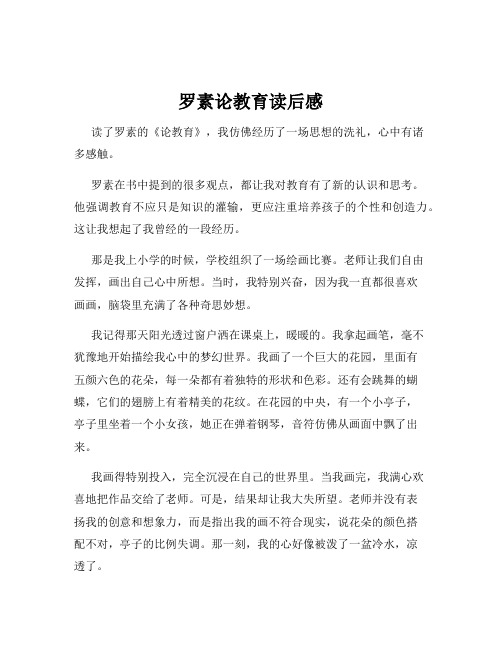
罗素论教育读后感读了罗素的《论教育》,我仿佛经历了一场思想的洗礼,心中有诸多感触。
罗素在书中提到的很多观点,都让我对教育有了新的认识和思考。
他强调教育不应只是知识的灌输,更应注重培养孩子的个性和创造力。
这让我想起了我曾经的一段经历。
那是我上小学的时候,学校组织了一场绘画比赛。
老师让我们自由发挥,画出自己心中所想。
当时,我特别兴奋,因为我一直都很喜欢画画,脑袋里充满了各种奇思妙想。
我记得那天阳光透过窗户洒在课桌上,暖暖的。
我拿起画笔,毫不犹豫地开始描绘我心中的梦幻世界。
我画了一个巨大的花园,里面有五颜六色的花朵,每一朵都有着独特的形状和色彩。
还有会跳舞的蝴蝶,它们的翅膀上有着精美的花纹。
在花园的中央,有一个小亭子,亭子里坐着一个小女孩,她正在弹着钢琴,音符仿佛从画面中飘了出来。
我画得特别投入,完全沉浸在自己的世界里。
当我画完,我满心欢喜地把作品交给了老师。
可是,结果却让我大失所望。
老师并没有表扬我的创意和想象力,而是指出我的画不符合现实,说花朵的颜色搭配不对,亭子的比例失调。
那一刻,我的心好像被泼了一盆冷水,凉透了。
这件事情对我影响很大。
从那以后,我在画画的时候总是会小心翼翼,不敢再随心所欲地发挥,总是担心自己画得不对。
现在回想起来,这不正是教育中常常出现的问题吗?我们总是用所谓的“标准”和“规范”去束缚孩子的创造力,而忽略了他们内心最真实、最独特的想法。
罗素说,教育应该帮助孩子发现自己的兴趣和天赋,而不是把他们都培养成一个模子里刻出来的人。
想想我们现在的教育,太多的考试、太多的标准答案,让孩子们渐渐失去了探索和创新的勇气。
再看看身边的一些例子,有的孩子明明对音乐有着极高的天赋,却因为家长觉得学音乐没前途,非要让孩子去学奥数;有的孩子喜欢写作,却因为老师说作文要按照固定的格式来写,而渐渐失去了对写作的热情。
我们总是在追求所谓的“优秀”和“成功”,却忘记了每个孩子都是独一无二的,他们有着自己的闪光点和潜力。
罗素论教育读后感

罗素论教育读后感最近读了罗素的《论教育》,感触颇多呀!罗素在书中提到了很多关于教育的观点,让我对教育这件事儿有了更深的思考。
其中让我印象特别深刻的是他对于教育目的的阐述。
他说教育的目的不是为了让孩子适应社会,而是要培养他们独立思考和判断的能力,让他们能够追求真正的幸福和美好。
这让我想起了我身边发生的一件小事儿。
我有个小侄子,今年刚上小学三年级。
这小家伙聪明伶俐,鬼点子特别多,但就是学习成绩不太好。
他爸妈为了他的学习,那可是操碎了心,给他报了各种辅导班,什么数学、英语、语文,一个都没落下。
每天放学回家,小家伙连玩的时间都没有,就得坐在书桌前埋头苦读。
有一次周末,我去他家串门,正赶上他在写作业。
只见他愁眉苦脸地坐在那儿,手里握着笔,半天也没写出一个字来。
我凑过去一看,原来是一道数学题把他给难住了。
我就问他:“咋啦,小家伙,这题不会做?”他抬起头,一脸委屈地看着我说:“姑姑,这题太难了,我都想了好久了。
”我看了看题目,其实也不是特别难,就是需要换个思路去想。
我就开始引导他,给他讲了一些解题的思路和方法。
一开始,他听得云里雾里的,还是不明白。
我也不着急,慢慢地给他举例子,打比方,终于,他好像有点开窍了。
眼睛一下子亮了起来,兴奋地说:“姑姑,我懂了,我懂了!”然后,刷刷刷地就把答案写了出来。
看着他那高兴的样子,我心里却有点不是滋味。
我在想,我们现在的教育是不是给孩子太多的压力了?为了追求成绩,让他们失去了本该拥有的快乐童年。
就像我小侄子,每天被各种作业和辅导班压得喘不过气来,都没时间去做自己喜欢的事情。
罗素说,教育应该是启发式的,要让孩子在学习中感受到乐趣和成就感。
可现实中,很多时候我们的教育却变成了填鸭式的,只是一味地给孩子灌输知识,却不关心他们是否真正理解和掌握。
还有一次,学校组织了一场绘画比赛。
小侄子特别喜欢画画,所以特别积极地参加了。
他花了好几天的时间,精心画了一幅自己心目中的美丽家园。
交上去之后,满心期待着能得到一个好成绩。
罗素论教育

罗素论教育(节选)2008-10-06 19:50——节选自《罗素自选文集》通常,教育是站在现存事物一方的最强大的力量,它反对根本性的变革。
遭到变革所威胁的社会制度依然是强有力的,它一家独掌着教育机器,在孩子们可塑的心灵中灌输观念,使他们尊重社会习俗的精华。
主张变革者则起而反击,力图把对手从优越的地位上撵下去。
但双方都没有考虑孩子的自身需要,而是只把他们当作单纯的一堆物质材料,以便为这支部队或那个军团补充新的兵源。
如果考虑到孩子们的需要,教育就不应把争夺儿童当作宗旨,而应培养孩子的能力,使他们在双方之间作出明智的选择,并以此作为教育的目标。
教育应当培养孩子思考的能力,而不是培养他们按照老师所想的那样去想问题。
如果我们能够尊重孩子的权利,那么教育就不再是一种政治武器。
如果我们尊重孩子的权利,我们就应当视教育为向儿童赠予知识和精神习惯,因为只有掌握这些东西才能形成独立的观念。
但是,作为一种政治力量的教育却竭力把习惯的形成和知识的限定纳入特定的轨道,目的是建立一套让人必须接受的观念体系。
……越是不容回避权威性,就越是需要尊重他人。
一个人只要想做到教育有方,想使孩子成长为有才干的重要人物,他就必须彻彻底底地充满了尊重精神。
那些提倡“机械化生产铸铁体系”的人们——改革者和保守分子——试图把人类精神强行注入军国主义、资本主义、费边科学社,以及其他一切牢笼之中。
这些人所缺少的正是对他人的尊重。
在教育领域中充斥着政府部门发布的规章制度、庞大的班级、一成不变的课程、不堪重负的老师,以及一定要生产出水平完全一致的能说会道的庸才。
凡此种种,唯独缺少对于孩子的尊重,这几乎成了普遍现象。
尊重他人是需要想像力和必要的热情的;特别是对于那些取得了些微实际成就和有权力的人来说,尊重他人就更需要想像力了。
孩子是弱者,而且有些肤浅愚笨;而教师是强者,并且在各方面都比孩子更聪明。
由于儿童外在的弱势,不尊重人的教师和不尊重人的官僚,动辄就会蔑视孩子。
罗素论“教育的四种品质”

罗素(1872--1970)英国唯心主义哲学家、数学家。
1920年曾来到中国讲学,在旧中国学术界产生相当大的影响,他的主要著作有《数学原理》《西方哲学史》等我愿提出四种品质,在我看,它们共同形成理想品格的基础,这就是说:活力、勇气、敏感和智慧。
我并不认为这个罗列是全面的了,但是我认为它对我们有很大帮助。
再者,我坚信,通过对儿童身体、感情和智力上恰当的爱护,可以使这些品质非常普遍。
我将逐一分析这些品质。
活力,与其说是一种精神品质,倒不如说是一种生理特质。
活力大概总与良好的身体状况伴随在一起,但它随着人的年龄增长而趋向衰退,并且到了老年时渐渐化为乌有。
在生机勃勃的孩子入学之前,活力很快上升到一个最高阶段;在儿童入学之后,会由于受教育而趋向减弱。
哪儿有活力,即使没特定的令人愉快环境,哪儿也会有充满生气的愉悦。
活力能增加生命的喜悦,减少生活的痛苦。
不论发生什么情况,活力能容易地给人们带来种利益,它作一种明智判断的基础,能促进客观现实的变化。
人类易于变得只注意身体,而对他们自身之的所见所闻不易感兴趣。
既然活力能够帮助人类承担最大的烦恼和最大的忧郁,所以这样做对人们自己是一个巨大的不幸。
除了罕见的情形之外,这样做对人们取得实际利益也是种致命的障碍。
活力增进外部世界的得益;它也增进人们勤奋工作力量。
而且,活力一种反对嫉妒的防护措施,因为它能使一个人一直心情愉快。
由于嫉妒是人类痛苦的最大根源之一,所以防范嫉妒是活力的一个非常重要的优点。
许多坏品质是和活力的进程一致的:例如,牛顿和洛克就几乎没有活力。
无论如何,牛顿和洛克却容易激动和嫉妒,而这些缺点能为身体健康的人所克服。
假如牛顿的身体更加健康并能享受日常生活的快乐,也许那场毁坏英国一百多年数学发展的牛顿与莱布尼茨的争论,本来是可以避免。
因此,尽管活力具有局限因素,但我还是把它看作是所有的人应该具有的最重要的品质之一。
勇气,我们所列出的第二种品质,它具有多种形式且复杂多变。
罗素论教育读书笔记原文摘抄

罗素论教育读书笔记原文摘抄【罗素论教育读书笔记原文摘抄】1. 引言罗素,20世纪英国著名哲学家、数学家和逻辑学家,他的思想深刻而富有启发性,对于教育和知识的探讨尤为精彩。
在其著作中,他对教育和读书的观点颇具独到见解,笔者将结合其原文摘抄,深入探讨罗素的观点,并进行个人观点的分析和总结。
2. 教育的本质罗素在其著作中提到教育的本质在于培养学生独立思考和批判性思维的能力。
他认为,教育不应仅仅是灌输知识,而是要培养学生自主学习和批判性思考的能力,使其能够独立思考并做出理性的判断。
这一观点与现今教育理念中的“素质教育”有着异曲同工之妙,强调了独立思考和批判性思维的重要性。
3. 读书的意义与方法在罗素看来,读书是获取知识和提高思维能力的重要途径。
他认为,通过广泛阅读,人们可以接触到各种不同的观点和思想,从而开拓自己的视野,培养自己的思维。
然而,罗素也提到,读书并非只是为了获取知识,更重要的是要学会从书中获取真理,并将其运用到实际生活中。
这一观点与当下“精读”的概念不谋而合,提醒人们要注重阅读质量而非数量。
4. 个人观点在我看来,罗素论教育和读书的观点颇为深刻。
教育的目的应当是培养学生全面发展和独立思考的能力,而读书则是实现这一目标的重要途径。
而且,我认为,读书不仅仅可以帮助我们获取知识,更重要的是要学会批判性思考,擅于分辨真伪,这样才能真正从书本中获取知识和智慧。
5. 总结通过对罗素论教育和读书的探讨,我们可以得出教育的本质在于培养学生独立思考和批判性思维的能力,而读书则是实现这一目标的重要途径。
要注重精读而非泛读,注重获取真理而非数量。
这些观点对于我们当下的教育和阅读方式有着重要的启示意义,希望能引起更多人的重视和思考。
以上便是我根据罗素论教育读书笔记原文摘抄撰写的解读与观点,希望能够对您有所帮助。
罗素对教育和读书的观点的确是深刻而富有启发性的。
他所强调的独立思考和批判性思维的能力,正是当今社会所需要的素质之一。
罗素论教育
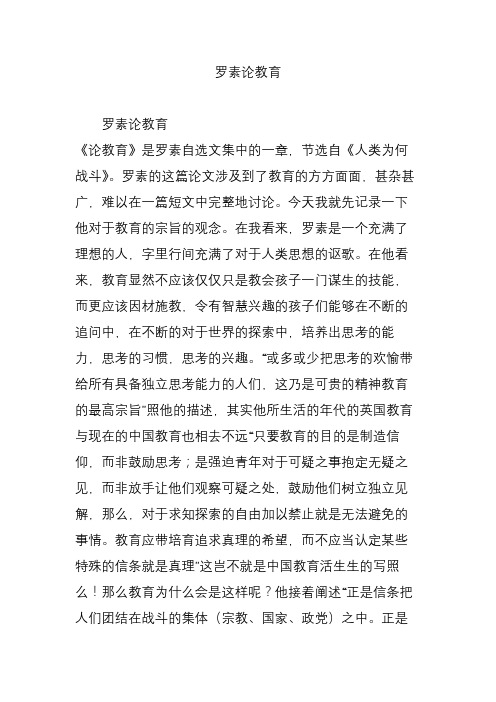
罗素论教育罗素论教育《论教育》是罗素自选文集中的一章,节选自《人类为何战斗》。
罗素的这篇论文涉及到了教育的方方面面,甚杂甚广,难以在一篇短文中完整地讨论。
今天我就先记录一下他对于教育的宗旨的观念。
在我看来,罗素是一个充满了理想的人,字里行间充满了对于人类思想的讴歌。
在他看来,教育显然不应该仅仅只是教会孩子一门谋生的技能,而更应该因材施教,令有智慧兴趣的孩子们能够在不断的追问中,在不断的对于世界的探索中,培养出思考的能力,思考的习惯,思考的兴趣。
“或多或少把思考的欢愉带给所有具备独立思考能力的人们,这乃是可贵的精神教育的最高宗旨”照他的描述,其实他所生活的年代的英国教育与现在的中国教育也相去不远“只要教育的目的是制造信仰,而非鼓励思考;是强迫青年对于可疑之事抱定无疑之见,而非放手让他们观察可疑之处,鼓励他们树立独立见解,那么,对于求知探索的自由加以禁止就是无法避免的事情。
教育应带培育追求真理的希望,而不应当认定某些特殊的信条就是真理”这岂不就是中国教育活生生的写照么!那么教育为什么会是这样呢?他接着阐述“正是信条把人们团结在战斗的集体(宗教、国家、政党)之中。
正是信条中凝聚的信仰产生了战斗力,使胜利归属于那些对可疑之事抱定最坚定信念的人们。
而实际上,对可疑之事投以疑问才是理智的态度。
”很明白,可不就是这么一个道理!想当年,民国的宽松空气鼓舞了青年人去主动思考,去追求各种信仰而不是某一个特定的“正确答案”,到最后,胜出的可不就是那群信仰最坚定的人么?但是信仰坚定与理性思考,本身就是矛盾的两个概念。
一时的武力的胜利,并不能说明有坚定的信仰就要比有理性的充满怀疑的思维的要强;毕竟,斯巴达可以用坚强的纪律打败雅典,但是雅典的公民精神,理性的论辩,自由的思维发展所结出的精神之花才是能永世让后人向往的。
那么在理想状态下,教育的目的就很明白了,而且为何理想的教育无法在社会范围内得到广泛的推行也变得很显然。
政党,当权者,既得利益者,从自己的角度出发,必然会希望以符合自己利益的方式去教育孩子,用重复性的填鸭式教育扼杀他们的思考能力,毕竟,有思考能力的奴隶最危险。
罗素中国的问题读后感

罗素中国的问题读后感
正文
《罗素中国的问题》是英国哲学家伯特兰·罗素所著,1922年出版的一本书。
这本书主要探讨了中国社会、政治和文化的问题,对当时的中国状况进行了客观而深入的分析。
读完这本书,我对中国的问题有了更深刻的理解和认识。
在书中,罗素首先谈到了中国的政治问题。
他指出,中国在政治制度方面存在许多问题,特别是官僚主义和腐败的现象严重影响了国家的发展。
他还提到了中国的社会问题,如贫富差距、农民问题和社会不平等等。
这些问题在当今中国仍然存在,并且仍然是中国社会发展的障碍。
罗素还对中国的文化进行了评价。
他认为中国的文化传统深厚丰富,但却缺乏对思想和创新的尊重,这限制了中国的进步。
他还提到了中国的教育问题,认为中国的教育体制过于注重死记硬背,不重视培养学生的创造性思维和批判性思维能力。
读完《罗素中国的问题》,我深刻认识到中国在过去几十年里取得了巨大的发展和进步。
但同时,我也意识到中国仍然面临着许多挑战和问题。
中国政府应该重视并解决这些问题,以实现可持续发展和社会稳定。
总之,罗素在《罗素中国的问题》这本书中对中国的问题进行了深入的分析和评价。
他客观地指出了中国在政治、社会和文化方面存在的问题,并提出了一些解决问题的建议。
罗素论教育读后感

罗素论教育读后感在这个纷繁复杂的世界里,教育一直是个备受关注的话题。
最近读了罗素的《论教育》,感触颇多。
罗素在书中阐述了许多关于教育的独到见解,让我对教育有了新的认识。
他强调教育不应只是知识的灌输,更应注重培养孩子的个性和创造力。
这让我想起了自己小时候的经历。
那时候,我在一所乡村小学读书。
学校的条件很简陋,没有漂亮的教学楼,也没有先进的教学设备。
但是,有一位老师却给我留下了极其深刻的印象。
她姓王,是我们的语文老师。
王老师总是穿着朴素,脸上带着亲切的笑容。
在她的课堂上,从来不是枯燥地照本宣科。
记得有一次,她给我们讲古诗《静夜思》。
她没有一开始就解释诗句的意思,而是先给我们讲了一个小故事。
她说:“同学们,你们想想看,在一个安静的夜晚,一个人独自在外,住在一个陌生的地方。
周围没有熟悉的家人和朋友,他躺在一张小小的床上,翻来覆去睡不着。
这时候,他透过窗户看到了天上那一轮明亮的月亮,会是什么样的心情呢?” 我们都被这个故事吸引住了,纷纷开始想象那个画面。
然后,王老师才开始一句一句地给我们解释诗句。
“床前明月光,疑是地上霜。
”她一边解释,一边用手比划着,让我们仿佛真的看到了那洒在地上的月光,像霜一样洁白。
“举头望明月,低头思故乡。
”说到这一句的时候,她的声音变得有些低沉,眼神里透露出一丝淡淡的忧伤。
在王老师的引导下,我们不仅理解了诗句的意思,更感受到了诗人在异乡的孤独和对家乡的思念之情。
这堂课让我明白了,好的教育不是简单地告诉我们知识是什么,而是让我们自己去感受、去体会。
还有一次,学校组织了一场作文比赛。
我当时特别紧张,不知道该写什么。
王老师看出了我的焦虑,她轻轻地拍了拍我的肩膀说:“别担心,就把你心里想的、看到的、感受到的写出来就行。
”在她的鼓励下,我写了一篇关于春天的作文。
我描述了春天里田野里的油菜花,黄澄澄的一片,像金色的海洋;我写了小溪边的柳树,嫩绿的柳枝随风飘舞,就像小姑娘的辫子;我还写了在田埂上奔跑玩耍的我们,笑声在春风中回荡。
罗素论教育读后感

罗素论教育读后感读了罗素的《论教育》,我仿佛经历了一场奇妙的思想之旅。
这本书没有那种晦涩难懂的理论堆砌,反而像是一位智者在和我亲切地交谈,分享他对于教育的深刻洞察和独到见解。
罗素在书中强调了教育不应只是知识的灌输,更应是培养个体的独立思考能力和创造力。
这让我想起了自己小时候的一段经历。
那时候,我还在上小学,数学成绩一直不太好。
老师在课堂上讲的那些公式和解题方法,对我来说就像天书一样。
每次考试,看着那些密密麻麻的数字和符号,我就感到一阵头晕目眩。
有一次,数学老师布置了一道特别难的应用题。
题目是这样的:“一个水池,单开进水管 5 小时能灌满,单开排水管 8 小时能排空。
如果同时打开进水管和排水管,多久能灌满水池?”我盯着这道题,苦思冥想了好久,还是毫无头绪。
于是,我按照老师教的方法,设水池的总量为 1,进水管的效率为 1/5,排水管的效率为 1/8,然后列出方程求解。
可是,算来算去,总是得出错误的答案。
我感到非常沮丧,觉得自己真的太笨了,连这么简单的题都做不出来。
就在我准备放弃的时候,爸爸走了过来。
他看了看题目,没有直接告诉我答案,而是问我:“你想想,如果进水管和排水管同时开,每小时水池里的水是增加了还是减少了?”我想了想说:“应该是增加了,因为进水管进水的速度比排水管排水的速度快。
”爸爸点了点头,说:“那增加的速度是多少呢?”我恍然大悟,说:“是 1/5 1/8 = 3/40。
”爸爸笑着说:“对呀,那灌满水池需要的时间不就是 40/3 小时吗?”通过爸爸的引导,我不仅做出了这道题,更重要的是,我学会了从不同的角度去思考问题。
从那以后,我不再死记硬背那些公式和方法,而是试着去理解问题的本质,寻找解决问题的思路。
罗素还提到,教育要关注个体的兴趣和天赋。
这让我想起了我的表弟。
表弟从小就对画画特别感兴趣,经常拿着画笔在纸上涂涂画画。
可是,姑姑却觉得画画没什么前途,非要让他去学钢琴。
表弟每次去上钢琴课都无精打采的,弹出来的曲子也是磕磕绊绊。
罗素论教育读书笔记原文摘抄

罗素论教育读书笔记原文摘抄
【实用版】
目录
一、罗素论教育的重要性
二、罗素对教育目的的看法
三、罗素论教育的方法
四、罗素论教育的成果
正文
一、罗素论教育的重要性
罗素认为,教育是提高人类文明水平和促进社会进步的关键因素。
他强调,教育不仅是传授知识,更是培养人的思维能力和道德品质。
教育能够帮助人们更好地理解自己和世界,提高人的自主性和创造力,从而使个体和社会都能得到更好的发展。
二、罗素对教育目的的看法
罗素主张教育应以培养人的理性思维和道德品质为目的。
他提倡教育要注重培养学生的批判性思维,让他们能够独立地思考问题,而不是盲从权威。
此外,罗素认为教育还应该关注人的情感和道德教育,使学生在追求知识的过程中,能够更好地理解自己和他人,培养出一种理性而又充满爱心的人生态度。
三、罗素论教育的方法
罗素认为,教育的方法应该注重因材施教,让每个学生都能够发挥自己的特长和潜能。
他主张教育要注重培养学生的兴趣和爱好,让他们在自主学习和探索中成长。
此外,罗素还认为,教育应该注重实践,让学生在实际操作中学会运用知识,从而提高他们的实践能力和综合素质。
四、罗素论教育的成果
罗素认为,教育的成果不应仅仅以学生的学术成绩来衡量,而更应该关注他们的综合素质和社会贡献。
他强调,教育成功的标志在于学生能否将所学知识运用于实际生活和工作中,为社会和人类作出积极的贡献。
罗素论教育读书笔记

罗素论教育读书笔记
罗素论教育读书笔记
1. 教育的目的是培养人的全面发展。
罗素认为,教育的目标应该是培养学生的思辨能力、批判思维能力和创造力,使他们能够独立思考和理解世界的本质。
2. 教育应该培养学生的人文素养和道德观念。
罗素认为,学生不仅需要掌握学科知识,还需要培养一种关爱他人和尊重他人的价值观念,以及正确的道德观念。
3. 对于学科知识的教育要注重培养学生的独立思考和批判思维能力。
罗素认为,学生应该被启发思考问题的本质,而不是被灌输记忆和接受现成答案。
教师应该鼓励学生提出问题并进行深入的思考,以培养他们的批判思维能力。
4. 教育应该注重培养学生的创造力和创新能力。
罗素认为,教育应该鼓励学生从不同的角度思考问题,并提供创造性的解决方案。
学生应该被鼓励思考和尝试新的方法和观点,以培养他们的创新能力。
5. 教育应该注重自由和开放的环境。
罗素认为,学校应该是一个鼓励学生自由思考和表达观点的地方。
教师应该尊重学生的意见和想法,并鼓励他们参与讨论和辩论,以培养他们的思辨能力和表达能力。
总结:罗素认为,教育应该注重培养学生的思辨能力、批判思
维能力、创造力和创新能力。
教育应该培养学生的人文素养和道德观念,同时提供一个自由和开放的环境,鼓励学生自由思考和表达观点。
罗素论教育读书笔记
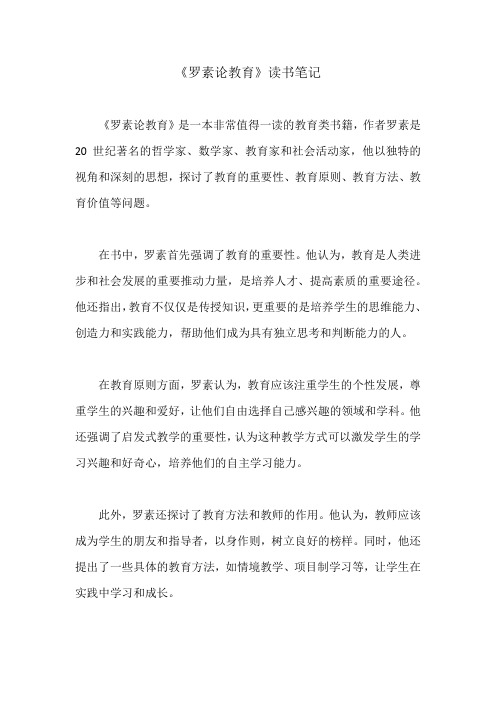
《罗素论教育》读书笔记
《罗素论教育》是一本非常值得一读的教育类书籍,作者罗素是20世纪著名的哲学家、数学家、教育家和社会活动家,他以独特的视角和深刻的思想,探讨了教育的重要性、教育原则、教育方法、教育价值等问题。
在书中,罗素首先强调了教育的重要性。
他认为,教育是人类进步和社会发展的重要推动力量,是培养人才、提高素质的重要途径。
他还指出,教育不仅仅是传授知识,更重要的是培养学生的思维能力、创造力和实践能力,帮助他们成为具有独立思考和判断能力的人。
在教育原则方面,罗素认为,教育应该注重学生的个性发展,尊重学生的兴趣和爱好,让他们自由选择自己感兴趣的领域和学科。
他还强调了启发式教学的重要性,认为这种教学方式可以激发学生的学习兴趣和好奇心,培养他们的自主学习能力。
此外,罗素还探讨了教育方法和教师的作用。
他认为,教师应该成为学生的朋友和指导者,以身作则,树立良好的榜样。
同时,他还提出了一些具体的教育方法,如情境教学、项目制学习等,让学生在实践中学习和成长。
最后,罗素还谈到了教育的价值。
他认为,教育的价值在于培养学生的智慧和创造力,让他们成为具有独立思考和判断能力的人。
他还指出,教育的价值不仅在于个人的成长和发展,更在于对社会的贡献和影响。
总的来说,《罗素论教育》是一本非常有思想性和启发性的教育类书籍。
通过阅读这本书,我们可以更深入地理解教育的意义和价值,反思当前教育存在的问题和不足之处,从而更好地推动教育事业的发展。
罗素论教育读书笔记原文摘抄

罗素论教育读书笔记原文摘抄
下面是罗素在《论教育》一书中的一些读书笔记原文摘抄:
1. "真正的教育应该是培养学生的独立思考能力,而不是简单地灌输知识。
" (原文出自第一章:教育的目的)
2. "教育不应该仅仅注重学科知识,还应该培养学生的道德品质和社会意识。
" (原文出自第二章:德育与学科教育)
3. "学校应该创造一个自由开放的环境,鼓励学生自由表达自己的观点,并接受不同观点的挑战。
" (原文出自第三章:学校和教学)
4. "教育应该注重培养学生的创造力和解决问题的能力,而不是简单地灌输标准答案。
" (原文出自第四章:教学方法和学习技巧)
5. "教师应该充当指导者和激励者的角色,而不是仅仅扮演知识传授者的角色。
" (原文出自第五章:教师的角色)
6. "教育应该追求个体的全面发展,而不是仅仅追求学术成就或者职业成功。
" (原文出自第六章:教育的效果评估)
这些摘抄展示了罗素在《论教育》一书中对教育的观点和理念的一些关键论述。
罗素品性教育观对我国学校道德教育的启示——基于《教育与美好生活》一书
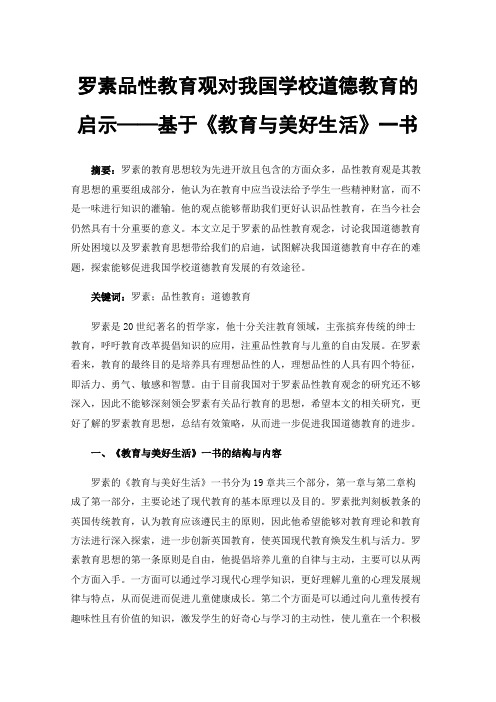
罗素品性教育观对我国学校道德教育的启示——基于《教育与美好生活》一书摘要:罗素的教育思想较为先进开放且包含的方面众多,品性教育观是其教育思想的重要组成部分,他认为在教育中应当设法给予学生一些精神财富,而不是一味进行知识的灌输。
他的观点能够帮助我们更好认识品性教育,在当今社会仍然具有十分重要的意义。
本文立足于罗素的品性教育观念,讨论我国道德教育所处困境以及罗素教育思想带给我们的启迪,试图解决我国道德教育中存在的难题,探索能够促进我国学校道德教育发展的有效途径。
关键词:罗素;品性教育;道德教育罗素是20世纪著名的哲学家,他十分关注教育领域,主张摈弃传统的绅士教育,呼吁教育改革提倡知识的应用,注重品性教育与儿童的自由发展。
在罗素看来,教育的最终目的是培养具有理想品性的人,理想品性的人具有四个特征,即活力、勇气、敏感和智慧。
由于目前我国对于罗素品性教育观念的研究还不够深入,因此不能够深刻领会罗素有关品行教育的思想,希望本文的相关研究,更好了解的罗素教育思想,总结有效策略,从而进一步促进我国道德教育的进步。
一、《教育与美好生活》一书的结构与内容罗素的《教育与美好生活》一书分为19章共三个部分,第一章与第二章构成了第一部分,主要论述了现代教育的基本原理以及目的。
罗素批判刻板教条的英国传统教育,认为教育应该遵民主的原则,因此他希望能够对教育理论和教育方法进行深入探索,进一步创新英国教育,使英国现代教育焕发生机与活力。
罗素教育思想的第一条原则是自由,他提倡培养儿童的自律与主动,主要可以从两个方面入手。
一方面可以通过学习现代心理学知识,更好理解儿童的心理发展规律与特点,从而促进而促进儿童健康成长。
第二个方面是可以通过向儿童传授有趣味性且有价值的知识,激发学生的好奇心与学习的主动性,使儿童在一个积极自主的状况下进行知识的学习。
罗素认为,儿童早期所形成的良好习惯对其发展起着至关重要的作用,有助于良好的品性和美德的形成。
罗素论教育中的自由与权威教育管理
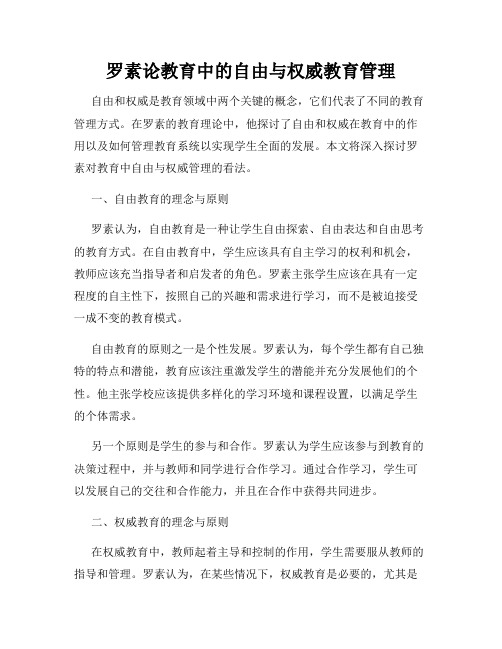
罗素论教育中的自由与权威教育管理自由和权威是教育领域中两个关键的概念,它们代表了不同的教育管理方式。
在罗素的教育理论中,他探讨了自由和权威在教育中的作用以及如何管理教育系统以实现学生全面的发展。
本文将深入探讨罗素对教育中自由与权威管理的看法。
一、自由教育的理念与原则罗素认为,自由教育是一种让学生自由探索、自由表达和自由思考的教育方式。
在自由教育中,学生应该具有自主学习的权利和机会,教师应该充当指导者和启发者的角色。
罗素主张学生应该在具有一定程度的自主性下,按照自己的兴趣和需求进行学习,而不是被迫接受一成不变的教育模式。
自由教育的原则之一是个性发展。
罗素认为,每个学生都有自己独特的特点和潜能,教育应该注重激发学生的潜能并充分发展他们的个性。
他主张学校应该提供多样化的学习环境和课程设置,以满足学生的个体需求。
另一个原则是学生的参与和合作。
罗素认为学生应该参与到教育的决策过程中,并与教师和同学进行合作学习。
通过合作学习,学生可以发展自己的交往和合作能力,并且在合作中获得共同进步。
二、权威教育的理念与原则在权威教育中,教师起着主导和控制的作用,学生需要服从教师的指导和管理。
罗素认为,在某些情况下,权威教育是必要的,尤其是在培养学生基本知识和理论框架时。
教师在权威教育中扮演着权威人物的角色,他们对于学生学习的方向和目标具有决定性的影响力。
权威教育的原则之一是纪律和规范。
罗素认为学校应该制定一系列的纪律和规范,以使学生养成良好的学习态度和行为习惯。
教师在权威教育中负责对学生的行为进行约束和规范,以保持课堂秩序和学习效果。
另一个原则是教师的专业性。
在权威教育中,教师需要具备专业的知识和技能,能够为学生提供准确和有效的教学指导。
罗素主张教师应该通过教育学习和专业发展来提高自己的教学水平,以更好地满足学生的学习需求。
三、自由与权威的教育管理在教育管理中,自由与权威并不是对立的概念。
罗素认为,自由和权威应该相互补充,二者可以结合运用以实现教育的最佳效果。
罗素论教育读书笔记原文摘抄
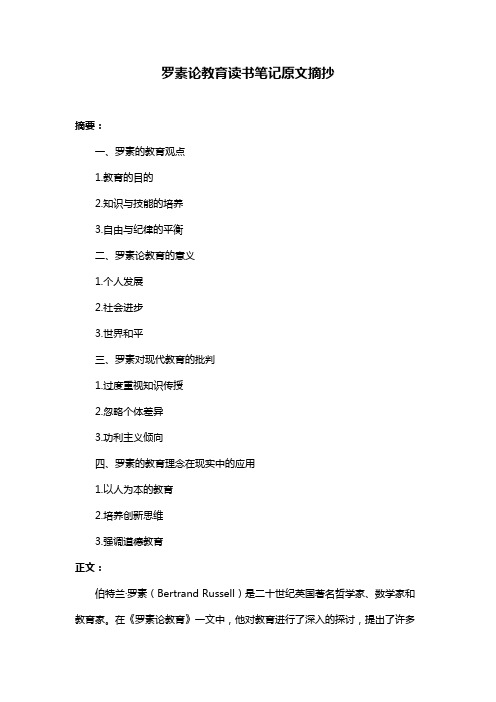
罗素论教育读书笔记原文摘抄摘要:一、罗素的教育观点1.教育的目的2.知识与技能的培养3.自由与纪律的平衡二、罗素论教育的意义1.个人发展2.社会进步3.世界和平三、罗素对现代教育的批判1.过度重视知识传授2.忽略个体差异3.功利主义倾向四、罗素的教育理念在现实中的应用1.以人为本的教育2.培养创新思维3.强调道德教育正文:伯特兰·罗素(Bertrand Russell)是二十世纪英国著名哲学家、数学家和教育家。
在《罗素论教育》一文中,他对教育进行了深入的探讨,提出了许多独到的观点。
首先,罗素认为教育的目的是培养具有全面素质的人才,而非仅仅传授知识。
他强调,教育应该注重学生的全面发展,包括智力、体力、情感和道德等方面。
在此基础上,学生才能在未来的生活和工作中更好地适应社会,实现个人价值。
其次,罗素认为知识和技能的培养是教育的重要内容。
他强调,教育应该引导学生探索未知领域,培养独立思考和创新能力。
此外,他还主张将技能培训与知识传授相结合,使学生在掌握理论知识的同时,具备实际操作的技能。
在自由与纪律的平衡方面,罗素认为教育应该既要注重培养学生的自主性和创造力,又要加强对学生的纪律教育。
只有这样,学生才能在自由的环境中健康成长,形成良好的品格和习惯。
罗素认为教育对于个人和社会都具有重要意义。
对于个人来说,教育是实现自我价值的途径,可以帮助我们认识世界、提升自己。
对于社会来说,教育是培养合格公民、促进社会进步的重要手段。
此外,罗素还强调,教育对于维护世界和平具有重要作用。
然而,罗素对现代教育持批判态度。
他认为现代教育过于重视知识的传授,而忽视了个体差异和兴趣爱好。
这导致许多学生在学习过程中感到无趣和痛苦,无法真正发挥自己的潜能。
此外,罗素还指出,现代教育中的功利主义倾向,使教育变得愈发狭隘和短视。
在现实应用中,我们可以借鉴罗素的教育理念,改进现有的教育制度。
首先,教育应以人为本,关注学生的个体差异,充分挖掘学生的潜能。
罗素论教育读书笔记
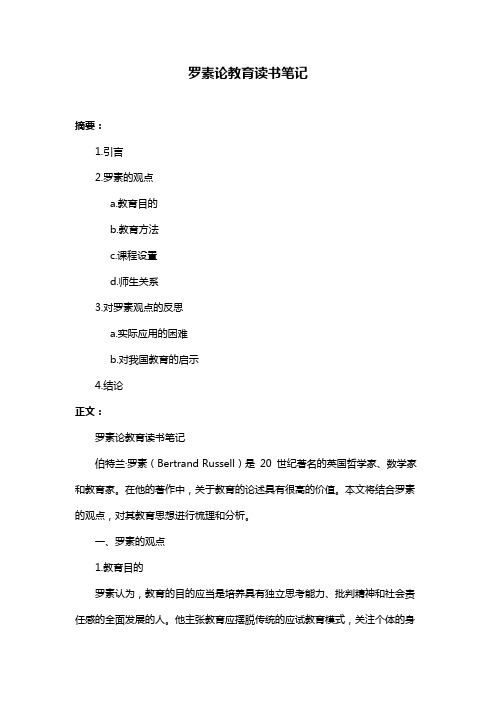
罗素论教育读书笔记摘要:1.引言2.罗素的观点a.教育目的b.教育方法c.课程设置d.师生关系3.对罗素观点的反思a.实际应用的困难b.对我国教育的启示4.结论正文:罗素论教育读书笔记伯特兰·罗素(Bertrand Russell)是20 世纪著名的英国哲学家、数学家和教育家。
在他的著作中,关于教育的论述具有很高的价值。
本文将结合罗素的观点,对其教育思想进行梳理和分析。
一、罗素的观点1.教育目的罗素认为,教育的目的应当是培养具有独立思考能力、批判精神和社会责任感的全面发展的人。
他主张教育应摆脱传统的应试教育模式,关注个体的身心发展,培养具有创造力和判断力的人才。
2.教育方法罗素提倡以兴趣为导向的教育方法,认为应根据学生的兴趣和特长进行因材施教。
此外,他还强调启发式教学,鼓励学生通过自主探究和讨论来培养独立思考能力。
3.课程设置罗素认为课程设置应当注重实用性和全面性。
除了传统的学科,还应包括哲学、心理学、艺术、历史等人文科学,以拓宽学生的视野,培养其健全的人格。
4.师生关系罗素主张师生之间应保持平等和尊重。
教师应鼓励学生提问和发表不同意见,培养学生的批判精神和创新意识。
同时,教师应以身作则,为学生树立良好的榜样。
二、对罗素观点的反思1.实际应用的困难尽管罗素的教育思想具有很高的前瞻性,但在实际应用过程中,可能会面临诸多困难。
例如,教育资源的不均衡分配、应试教育的压力以及教师队伍的素质问题等,都可能影响到教育改革的实施。
2.对我国教育的启示尽管面临诸多困难,但罗素的教育思想对我国教育改革仍具有一定的启示作用。
我们应在课程设置、教育方法和师生关系等方面进行改革,关注学生的个体差异,培养具有创新精神和批判思维的人才。
总之,罗素的教育思想为我们提供了一个全新的视角,值得我们深入研究和借鉴。
- 1、下载文档前请自行甄别文档内容的完整性,平台不提供额外的编辑、内容补充、找答案等附加服务。
- 2、"仅部分预览"的文档,不可在线预览部分如存在完整性等问题,可反馈申请退款(可完整预览的文档不适用该条件!)。
- 3、如文档侵犯您的权益,请联系客服反馈,我们会尽快为您处理(人工客服工作时间:9:00-18:30)。
Bertrand Russell on Chinese educationZHENG Wei-ping(School of Humanities and Social Sciences, Tsinghua University, Beijing 100084, China)Abstract: The visit of Bertrand Russell to China during 1920 to 1921 was one of the most significant events in May Fourth Movement, and Russell pointed out that education was the most important thing for Chinese reconstruction. The author argues that we should interpret Russell’s educational idea of China from a theoretic and practical point of view. The man in Chinese education is the key to the future of China.Key words: Bertrand Russell; Chinese education; May Fourth MovementInvited by a scholar association of Peking University, Russell delivered a series of lectures about the problems of China, besides his theory of logic and philosophy. Chinese intellectuals, young students, politicians made comments on his lectures with great enthusiasm. His influence on China was so great that former president SUN Yat-sen called him “the only foreigner who knows Chinese civilization” and in 1998, CAC (Cultural Academy of China) chose his lectures in China as “the most influential literatures on China in the 20th century” (Bertrand Russell, 2000, p. 293).Russell took Chinese education as a key to the Chinese problems. He wrote, “But as for the thought recently, I take Education as the first thing in various methods of Chinese reconstruction” (Bertrand Russell, 2000, p. 297). In this paper, besides a survey of Russell’s thoughts of Chinese education, which intersperse among Russell’s lectures and essays about Chinese problem. The author will argue that Russell’s solution of Chinese problem based on education is still useful for us.1. Analysis of Chinese educationUnlike present situation, Chinese education was not unified partly because its government was too weak and there were many forces in education. There were many forces in Chinese education, so Russell concluded that there were mainly three forms of Chinese education.1.1 Old-fashioned educationBefore disintegration of Qing Dynasty, there was only one kind of education in China, which Russell described as old-fashioned education. Old-fashioned education emphasized the learning of classical works, which mainly were the doctrine of Confucius and his followers. They had no interests in scientific knowledge, which was taken as being unnecessary to man’s happiness. The aim of education is to acquire the ability of “self-cultivation, regulating the family, governing the country and establishing peace throughout the world” (Bertrand Russell, 1922, p. 34).A man’s morality and political ability were the standard of his cultivated level, and a perfect example was the ZHENG Wei-ping, Ph.D. candidate, School of Humanities and Social Sciences, Tsinghua University; research field: Russell studies.60Saint such as the ancient emperors YAO and SHUN. Therefore, under the encouragement of government, all the best students tried their best to be a good politician. Under the influence of this doctrine, all of education was to learn and study classical works. Russell described in this way, “There is first the old traditional curriculum, the learning by rote of the classics without explanation in early youth, followed by a more intelligent study in later years. This is exactly like the traditional study of the classics in this country, as it existed, for example, in the eighteenth century” (Bertrand Russell, 1922, p. 46).This schema of education was destined to fail when facing the western science. But its tenacious life power was noticed by Russell, he wrote, “Such schools still form the majority, and give most of the elementary education that is given” (Bertrand Russell, 1922, p. 47).1.2 American educationAs for China, a series of war failure in early 20th century has resulted in a large number of war compensation and partly losing its self-government. Since what American lost in anti-China war was much less than what it demanded for compensation. Congress of USA decided to establish a series of American school in China by using a part of war compensation, and the best students could be sent to American for advanced study. To be frankly, American education has fastened the spread of natural science, introduced another kind of education, and trained a large number of students, who were an important force in Chinese education. But Russell was aware that the motivation of American education was not as noble as they described. Russell wrote, “They remain always missionaries—not of Christianity, though they often think that is what they are preaching, but of Americanism. What is Americanism? ‘Clean living, clean thinking, and pep’. I think an American would reply. This means, in practice, the substitution of tidiness for art, cleanliness for beauty, moralizing for philosophy, prostitutes for concubines (as being easier to conceal), and a general air of being fearfully busy for the leisurely calm of the traditional Chinese” (Bertrand Russell, 1922, p. 49).Indeed, its aim was to replace Chinese traditional culture by American culture. Similarly, American education played a role of invader. Russell holds a critical position about American education. The best Chinese educationists are aware of this, and have established schools and universities which are modern but under Chinese direction.1.3 Modern educationRussell was not satisfied with the former two kinds of Chinese education, but he highly praised modern education. Although it has many disadvantages, such as there was no adequate book or equipment, the teaching of English was not sufficiently thorough, and the courses were not very rational. As for Russell, these disadvantages would disappear if there would be a powerful government.Contrast with old-fashioned education, the system of courses of this kind of education was more westernized, and the students receiving modern education would learn more about natural science, industry, economy, which were ignored in old-fashioned education. Meanwhile, the advocators of modern education emphasized scholar freedom, and Russell wrote, “They respect the knowledge of Europeans, but quietly put aside their arrogance” (Bertrand Russell, 1922, p. 50). By this way, modern education was differed from American education. “Modern Chinese schools and universities are singularly different: they are not hotbeds of rabid nationalism as they would be in any other country, but institutions where the student is taught to think freely, and his thoughts are judged by their intelligence, not by their utility to exploiters” (Bertrand Russell, 2000, p. 301).61We can take the modern Chinese education as the Chinese version of American education. What Russell appreciating in modern Chinese education was its emphasis on pursuing a truth. Russell described the three forms of Chinese education as “the old traditional education, stands for Conservatism; America and its commerce and its educational institutions stand for liberalism; while the native modern education, practically though not theoretically, stands for Socialism. Incidentally, it alone stands for intellectual freedom” (Bertrand Russell, 1922, p.52).2. Why education first?This is an ignored problem in Russell’s studies. Some people thought it was an utopia idea, some doubted it because Russell, as an educator in Beacon Hill, was failed according to the statements of Katherine Russell, who is the daughter of Bertrand Russell. But the author argues that if we paid more attention to Russell’s educational theory and Chinese situation in 1910s, we would understand Russell’s opinion better.2.1 From a theoretical point of viewIn Russell’s educational theory, education plays a key role in civilization and social construction. According to Russell’s statements, there is a question that “whether education should train good individuals or good citizens”. Russell denied the latter. The fundamental characteristic of citizen is that he cooperates and is just a part of a society. Personal freedom disappears, and there is only the freedom of a whole. The society constituted by calm and tame citizens would not be democratic and possibly be regained by some ambiguous men. Russell dislikes this kind of society, “The whole educational machine in America, from the public schools to the universities, is concerned to emphasize citizenship. In my mind, it could be one important reason of Russell’s anti-America standpoint in 1910s which has sent him into jail” (Bertrand Russell, 2000, p. 276).Therefore, Russell thinks education should be a tool to reconstruct the society. As individual education, Russell said individuals mirrored the world. Russell believes that the purpose of education should be to cultivate a free man, to establish a bright future of human. We should be noted that Russell’s theory of education is correspond with his philosophy, Russell advocates a kind of atomism, rejected any kind of holism.In one word, Russell believes that “the issue between citizenship and individuality is important in education, in politics, in ethics, and in metaphysics” (Bertrand Russell, 1938, p. 14).2.2 From a practical point of viewIn all men concern with Chinese education, Russell paid more attention to the young students, who he called “Youth China”. On one hand, these students were very clever and longed for the western knowledge very much, Russell has gave an example, “The discussions which I used to have in my seminar (consisting of students belonging to the Peking Government University) could not have been surpassed anywhere for keenness, candor and fearlessness” (Bertrand Russell, 1922, p. 66). On the other hand, Youth China was a powerful force in China.A good example was the student’s objection on the problem of Shandong in the Versailles Treaty.Russell also felt surprised about the influence of Chinese intellectuals, the majority of whom were the teachers. There were two cases that could be used as example. The first thing was the movement of co-education about male and female. At that time, there was no enough elementary education in China for the girls, so if the girls could not go to the schools as the boys, they would not be able to get suitable education. Therefore, some provinces in China, such as Hunan, have adopted co-education. In Russell’s opinion, it was a greater improvement62than England, in which co-education had been only in talk.The second thing was the movement of teaching strike. Because they were not paid for several months, they went on a deputation to the government, but were repulsed by soldiers and policemen, who clubbed them so severely that many had to be taken to hospital. The incident produced such universal fury in China that there was nearly a revolution. The high position of teachers in Chinese society was from their spirit of self-sacrifice in the view of Russell. Chinese teachers dedicated themselves to Chinese education and Chinese reprosperity.In one word, Russell took the man about education, such as teachers, students, etc., as the hope and propellants of Chinese reconstruction.3. Some remarks on Russell’s viewIn the problem of China, Russell said that there were three things key to Chinese reconstruction, “The three chief requisites, I should say, are: (1) the establishment of an orderly government; (2) industrial development under Chinese control; (3) the spread of education” (Bertrand Russell, 1922, p. 73).In May Fourth Movement, there were two famous sirs: sir democracy and sir science. I take this as a westernize road and just a slogan. Russell’s solution is a realistic one and there is some analogy between Russell’s solution and Chinese practice, a Marxism way.In my mind, Russell took education as the condition of realization of first two requisites of Chinese reconstruction. An orderly government should be run by educated people, and Chinese industry should be established by educated people too. We should distinguish between education and the spread of education, education is a more general concept than the spread of education. It means the man related to education, the role of education, and so on. After visiting china, Russell “set up his own experimental school, Beacon Hill. This was partly opportunity to put his ideas into practice” (Nicholas Griffin, 2003, p. 11). Russell’s visit to China is successful and his idea about Chinese education will benefit us continually.References:Richard A. Remple. (Ed.) (2000). The collected papers of Bertrand Russell (vol. 15). Routledge Publisher.Bertrand Russell. (1922). The problem of China. The Century Company.Bertrand Russell. (1938). Education and the social order. Allen & Unwin Company.Nicholas Griffin. (2003). The Cambridge companion to Bertrand Russell. Cambridge University Press.(Edited by Lily and Nydia)63。
